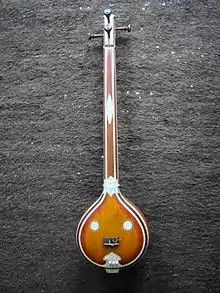| Carnatic music |
|---|
 |
| Concepts |
| Compositions |
| Instruments |
|
| Arohanam | S R₂ G₂ M₁ P D₂ N₃ Ṡ |
|---|---|
| Avarohanam | Ṡ N₃ D₂ P M₁ G₂ R₂ S |
| Equivalent | Melodic minor scale |
Gourimanohari or Gaurimanohari is a rāgam in Carnatic music (musical scale of South Indian classical music). It is the 23rd Melakarta rāgam in the 72 melakarta rāgam system of Carnatic music. The 23rd melakarta rāgam as per Muthuswami Dikshitar school of music is Gourivelāvaḻi.
The Western equivalent is the melodic minor scale.
The Hindustani music equivalent to this rāgam is Raag Patdeep.
Structure and Lakshana

It is the 5th rāgam in the 4th chakra Veda. The mnemonic name is Veda-Ma. The mnemonic phrase is sa ri gi ma pa dhi nu.[1] Its ārohaṇa-avarohaṇa structure (ascending and descending scale) is as follows (see swaras in Carnatic music for details on below notation and terms):
- ārohaṇa: S R₂ G₂ M₁ P D₂ N₃ Ṡ[lower-alpha 1]
- avarohaṇa: Ṡ N₃ D₂ P M₁ G₂ R₂ S[lower-alpha 2]
The notes used in this scale are shadjam, chatushruti rishabham, sadharana gandharam, shuddha madhyamam, panchamam, chatushruti daivatam and kakali nishadham. It is a sampurna rāgam – a rāgam that has all seven swaras (notes). It is the shuddha madhyamam equivalent of Dharmavati, which is the 59th melakarta.
Janya rāgams
It has a few minor janya rāgams (derived scales) associated with it. See List of janya rāgams to look up all rāgams associated with it.
Popular compositions
The following are a few popular compositions in this rāgam.
- Guruleka etuvanti by Thyagaraja
- Varalakshmi Namostute by Mysore Vasudevacharya
- Sarasa sama mridu pada by Swati Tirunal
- Brova Samayamide Ramayya by Karur Devudu Iyer
- Gangadhara Shiva by Sri Ganapathy Sachchidananda Swamiji
- Gauri Manohara by Papanasam Sivan
‘Shades of Blue: A Musical Tribute to Venmurasu’ sung by Kamal Haasan, Sriram Parthasarathy, Saindhavi composed by Rajan Somasundaram is considered to be the definition of this ragam as it explores various shades of expressions possible in Gaurimanohari using vocals, Sitar, Sarangi, Flute, singing bowls and various string instruments.[2]
Film Songs
Language : Hindi
Songs composed in Patdeep(Hindustani) which is equivalent to Gourimanohari (Carnatic)
| Song | Movie | Composer | Singers |
|---|---|---|---|
| Megha Chhaye Adhi Rat | Sharmeelee | S. D. Burman | Lata Mangeshkar |
| Saaz Ho Tum Avaaz Hun Main | Saaz Aur Awaz(1966 film) | Naushad | Mohammad Rafi[3] |
Language:Kannada
| Song | Movie/Album | Composer | Singer |
|---|---|---|---|
| Ennilla Enilla | Upendra | Gurukiran | Pratima Rao |
| Nanenu Ballenu Ninna | Nareyana Namamrutham | Mahesh Mahadev | Priyadarshini |
Language: Malayalam
Songs composed in Patdeep(Hindustani) which is equivalent to Gourimanohari (Carnatic)
| Song | Movie | Composer | Singers |
|---|---|---|---|
| Anuraga Lola gathri | Dhwani | Naushad | K. J. Yesudas & P. Susheela |
| Kathirunnu Kathirunnu | Ennu Ninte Moideen | M. Jayachandran | Shreya Ghoshal |
Language:Tamil
Language : Telugu
Songs composed in Patdeep(Hindustani) which is equivalent to Gourimanohari (Carnatic)
| Song | Movie | Composer | Singers |
|---|---|---|---|
| Aahasakhi Ee Vaname | Uma Chandi Gowri Sankarula Katha | Pendyala (composer) | P. Susheela |
| Naa Madhi Paadina | Pavitra Hrudayalu | T. Chalapathi Rao | Ghantasala (musician) |
| Nee Adugulona adugu vesi | Poola Rangadu (1967 film) | Ghantasala (musician) | Ghantasala (musician) & P. Susheela |
Below song is a traditional saint Tyagaraja Gowrimanohari Rendition used in film which sound similar to Patdeep(Hindustani)
Language : Telugu
| Song | Movie | Composer | Singers |
|---|---|---|---|
| Guruleka Etuvanti Guniki [4] | Tyagayya (1981 film) | K. V. Mahadevan | S. P. Balasubrahmanyam |
Albums
Tamil
| Song | Album | Composer | Singer |
|---|---|---|---|
| "Unnai Konjum Neram" | Unnai Konjum Neram – Single | Sanjay Ramakrishnan – Vijay Veerapandiyan | Sreekanth Hariharan, Amirt K Narayan |
Related rāgams
This section covers the theoretical and scientific aspect of this rāgam.
Gourimanohari's notes when shifted using Graha bhedam, yields 3 other major melakarta rāgams, namely, Vachaspati, Natakapriya and Charukesi. Graha bhedam is the step taken in keeping the relative note frequencies same, while shifting the shadjam to the next note in the rāgam. For further details and an illustration see Graha bhedam on Vachaspati.
Notes
References
- ↑ Ragas in Carnatic music by Dr. S. Bhagyalekshmy, Pub. 1990, CBH Publications
- ↑ "Director Mani Ratnam Releases Musical Tribute to Jeyamohan's Epic Venmurasu". www.marketwatch.com. Retrieved 20 October 2020.
- ↑ Goldmines Gaane Sune Ansune. "SaazHoTumAwaazHoonMain". youtube(videostreaming). Retrieved 1 June 2019.
- ↑ Carnatic Ecstasy. "GurulekaEtuvantiGunikiGaurimanohari". youtube(videostreaming). Retrieved 15 June 2018.